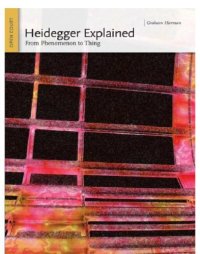
Ebook: Heidegger Explained: From Phenomenon To Thing
Author: Recorded Books Inc., Harman Graham
- Tags: Philosophy, PHILOSOPHY--Movements--Phenomenology, PHILOSOPHY -- Movements -- Phenomenology
- Year: 2011
- Publisher: Open Court
- City: New York
- Language: English
- epub
Heidegger Explained is a clear and thorough summary of the philosophy of Martin Heidegger (1889-1976). It gives a fascinating explanation of all stages of Heidegger's life and career, and shows his entire philosophy to emerge from one simple but profound insight. Many philosophers believe that Heidegger was the greatest philosopher of the twentieth century. His influence has long been felt not just in philosophy, but also in such fields as art, architecture, and literary studies. Yet the great difficulty of Heidegger's terminology has often scared away interested readers lacking an academic background in philosophy. Author Graham Harman shows that Heidegger is actually one of the simplest and clearest of thinkers. All the diverse topics of his writings, and all the lengthy analyses he gives of past philosophers, boil down to a single powerful idea: being is not presence. In any human relation with the world, our thinking and even our acting do not fully exhaust the world. Something more always withdraws from our grasp. Neither being itself nor individual beings are ever fully "present-at-hand," in Heidegger's terminology. This single insight allows Heidegger to revolutionize the phenomenology of his teacher Edmund Husserl. The method of Husserl was to focus entirely on how things present themselves to us as phenomena in consciousness. Heidegger understood that the things are always partly hidden from consciousness, living a secret life of their own. Human beings are not lucid scientific observers staring at the world and describing it, but instead are thrown into a world where light is always mixed with shadow. For Heidegger, the entire history of philosophy has reduced being to some sort of presence, whether by defining it as atoms, consciousness, perfect forms, the will to power, or even God. In this way, past philosophers have all chosen one specific kind of privileged being to represent being itself. Yet this is impossible, since being always partly withdraws from any attempt to define it. For this reason, philosophy needs to make a new beginning, one that would be just as great as the first beginning in ancient Greece. The book ends by shedding new light on Heidegger's concept of the fourfold, which is so notoriously difficult that most commentators avoid it altogether.;Preface -- Introduction -- 1. Biography -- Early Life -- Rising Star -- The Hitler Era -- Life after WWII -- Appearance and Character -- 2. A Radical Phenomenologist -- Husserl's Phenomenology -- 1919: Heidegger's Breakthrough -- 1920-21: Facticity and Time -- 1921-22: The Triple Structure of Life -- 1923: Being in the Public World -- 3. Marburg -- 1925: The Dragon Emerges -- 1927: Temporality and Being -- 1928: Human Transcendence -- 4. Being and Time -- The Question of Being -- Tools and Broken Tools -- Fallenness and Care -- Death, Conscience, and Resoluteness -- Dasein's Temporality -- 5. Freiburg before the Rectorate -- 1929: Nothingness -- 1929-30: On Boredom and Animals -- 1930: Veiling and Unveiling -- 6. A Nazi Philosopher -- 1933: The Rectoral Address -- 1933-34: Actions as Rector -- 7. Hermit in the Reich -- 1935: Inner Truth and Greatness -- 1935: Earth and World in the Artwork -- 1936: The Echo of Hölderlin -- 1936-38: The Other Beginning -- 1940: The Metaphysics of Nietzsche -- 8. Strange Masterpiece in Bremen -- The Thing -- The Enframing -- The Danger -- The Turn -- 9. The Task of Thinking -- 1950: Language Speaks -- 1951-52: We Are Still Not Thinking -- 1955: Releasement -- 1963-64: The End of Philosophy -- 10. Heidegger's Legacy -- His Legacy Now -- Looking Ahead -- Suggestions for Further Reading -- Glossary -- Appendix: Heidegger's Numerology -- Index.
Download the book Heidegger Explained: From Phenomenon To Thing for free or read online
Continue reading on any device:

Last viewed books
Related books
{related-news}
Comments (0)